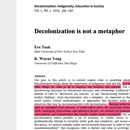Since the beginning of the women’s rights movement, many groups of women have been excluded from the battle towards equality and equity. In fact, they have been isolated from the battle for so long that feminism today often focuses on issues that affect only certain groups of women.
It is commonly said that women gained the right to vote in 1920. But how can we proudly claim that all women gained the right to vote in 1920 if Black women and other women of color didn’t get the right to vote until 1967?
How can we say that we’ve made strides to end workplace discrimination when employers still have the right to discriminate against transgender women and other underrepresented women who are a part of the LGBTQ+ community?
How can we claim to be intersectional when most feminists still focus their efforts on issues that only affect white, middle class, heterosexual women?
As a woman of color, I’ve always been wary to call myself a feminist. When I was younger, I realized that the only groups of people who called themselves feminists didn’t look like me and that the issues they were fighting for were very different than the issues I and the other women in my family faced. As I’ve grown older, I’ve began to see a change in this kind feminism, but unfortunately, there are many issues with the movement as it stands today.
For example, unless I am with other women of color discussing feminism, the issues that are discussed often put more emphasis on the feminine perspective of being a woman rather than the socio-economic and racial perspective of being a woman. Sexual practices, the anatomy of the vagina, and school dress codes are the most common topics brought up. This same phenomenon of exclusion occurs anytime I’m surrounded by primarily heterosexual, cisgender, Christian, middle to upper class, natural-born, neurotypical, abled and other women who are part of represented, privileged groups. This is an issue that is far too common for those who are a part of minority groups and it again goes back to the fact that the voices of these women have been shut down since the beginning of the movement. Without representation and recognition of privilege we see this trend become normalized.
By stating this, I am in no way saying that these topics are not important topics of discussion, but I am saying that if you’re a feminist that focuses primarily on these issues and rarely talks about issues that include ALL women, then you should probably restructure your ‘feminist agenda’. Because those who focus on issues that only affect themselves are those who often fail to recognize their own privilege.
Feminism has a long way to go and if you don’t see the issues within the movement then you have become a part of the problem. Being a feminist is much more than saying you love women and it feminism is more than an adjective, it is a way of thinking and acting.
Feminists, in my book, are activists and people who are constantly checking their own privilege and power to better serve those who are disadvantages by the systemic power structures. Above all, feminists are constantly challenging the status quo to reach a truly intersectional movement.


